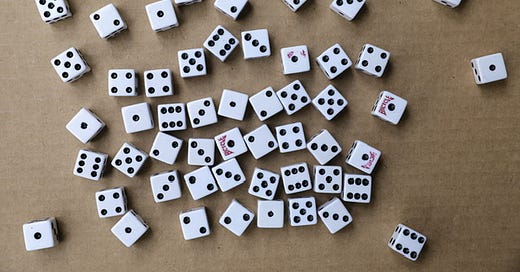A reader commented that his son hates worksheets. I bet his son is not alone. And I bet the father is also not alone in the mild anxiety this worksheet-aversion can induce.
For me, what really matters about maths is simple:
I want my children to become deeply comfortable and confident with numbers.
I don’t want them to fear making a mistake, and I don’t want them to panic when faced with a question they don’t immediately know how to solve. I want them to see maths as something you can play with.
Worksheets could form a part of achieving these aims, but they are certainly not the only way. So here is a list of how we do maths, every day, without worksheets and without resistance, and without the need to do lots of labour-intensive planning.

Simple do-it-yourself games from a variety of sources: Family Math (highly recommended, try Bookfinder); two maths books for teachers I picked up in Oxfam; Oxford Owl; the Math for Love website; NRICH from the University of Cambridge. We don’t do these all the time—we haven’t done any for a while whilst we focus on Multiplication by Heart—but I often pick one game the night before, and get it ready. It’s amazing how a piece of paper with a piggy bank drawn on it, and a stack of coins, is enough to intrigue the children and get them asking to play the game. When we do these every day the children get very grumpy if they walk into the sitting room in the morning and there’s no maths game waiting for them. The games are always an invitation rather than a request.
Wild Math has loads of ideas in each curriculum (arranged by age group) for taking maths outside, again with minimal preparation.
Khan Academy. My daughter loves this (partly because it’s almost unlimited screen time) and loves to see the bar getting slowly more filled in as she completes each module. It’s a good way to cover things like bar charts which don’t lend themselves to games and mental maths so easily.
Any board game involving two dice is a great way to practise addition, doubling, number bonds. And I made two giant dice out of cardboard. Any dice game is more fun with giant dice, and they’re good for playing maths games in the garden.
Maths Dice. Not a game you’d want to play every day but it’s a nice one to have in your collection. We have the junior version, which for my 5 and 7 year olds is now probably a bit too easy to be really engaging. There is a non-junior version which is more challenging.
Uno and other games using the Uno cards.
Tiny Polka Dot and Multiplication by Heart, of course, and other card games with a maths element.
Times tables challenges on the bus, or indeed anywhere.
Very, very occasional use of maths workbooks like this. We have one or two, and sometimes the children feel a sudden desire to complete a page or two. They never do them when I suggest it, obviously.
At tea time I sometimes make up stories with maths problems for them to solve. I like this because I can choose all sorts of different maths areas, whereas lots of maths games give you practice at one particular skill. I want to build their confidence in choosing the right skill for a particular problem. Each child insists on their own story and they can last for ages. It’s a lot of work for me though! Is there an online or book source for these stories to save me some effort?
We made a giant multiplication square which we are slowly filling in—not daily, but when we feel like it. We also have hundred squares with a wipe-clean reverse which are useful for practising adding ten, spotting patterns, and sometimes the children will choose to just fill in the reverse themselves.
Mathlink Cubes. We use these a lot. Sometimes just for building stuff, but they have also been incredibly helpful for maths. Square numbers, fractions, number bonds, arrays - is there anything you can’t demonstrate with a Mathlink Cube? Also excellent for strengthening small fingers and thumbs.
What’s your approach to maths and what are the books and games you swear by? Please share your thoughts in the comments.
If you don’t already subscribe, sign up to get new posts straight to your inbox.
If you’re enjoying How We Homeschool, please share it with your likeminded friends.




We find Reading Eggs App to be a great help. It has Maths and English. Wonderful animations. Learning is always a game.